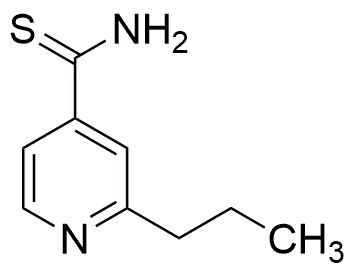Prothionamide is widely utilized in research focused on
- Tuberculosis Treatment: This compound is primarily used as an anti-tubercular agent, particularly for treating multidrug-resistant tuberculosis. It enhances treatment options for patients who do not respond to standard therapies.
- Pharmaceutical Development: Researchers are exploring prothionamide's efficacy in combination therapies, which can improve treatment outcomes and reduce the duration of therapy for various bacterial infections.
- Drug Resistance Studies: Prothionamide serves as a valuable tool in studying mechanisms of drug resistance in Mycobacterium tuberculosis, helping scientists develop new strategies to combat resistant strains.
- Research in Infectious Diseases: Its application extends to laboratory studies aimed at understanding the pharmacokinetics and pharmacodynamics of anti-tubercular drugs, providing insights into optimizing treatment regimens.
- Public Health Initiatives: Prothionamide is critical in public health efforts to control tuberculosis outbreaks, especially in high-burden countries, by offering effective treatment alternatives.
Información general
Propiedades
Seguridad y normativas
Aplicaciones
Prothionamide is widely utilized in research focused on
- Tuberculosis Treatment: This compound is primarily used as an anti-tubercular agent, particularly for treating multidrug-resistant tuberculosis. It enhances treatment options for patients who do not respond to standard therapies.
- Pharmaceutical Development: Researchers are exploring prothionamide's efficacy in combination therapies, which can improve treatment outcomes and reduce the duration of therapy for various bacterial infections.
- Drug Resistance Studies: Prothionamide serves as a valuable tool in studying mechanisms of drug resistance in Mycobacterium tuberculosis, helping scientists develop new strategies to combat resistant strains.
- Research in Infectious Diseases: Its application extends to laboratory studies aimed at understanding the pharmacokinetics and pharmacodynamics of anti-tubercular drugs, providing insights into optimizing treatment regimens.
- Public Health Initiatives: Prothionamide is critical in public health efforts to control tuberculosis outbreaks, especially in high-burden countries, by offering effective treatment alternatives.
Documentos
Hojas de datos de seguridad (HDS)
La SDS proporciona información de seguridad completa sobre la manipulación, el almacenamiento y la eliminación del producto.
Especificación del producto (PS)
La PS proporciona un desglose completo de las propiedades del producto, incluida la composición química, el estado físico, la pureza y los requisitos de almacenamiento. También detalla los rangos de calidad aceptables y las aplicaciones previstas del producto.
Certificados de análisis (COA)
Busque certificados de análisis (COA) ingresando el número de lote del producto. Los números de lote y de partida se pueden encontrar en la etiqueta de un producto después de las palabras "Lote" o "Lote".
Número de catálogo
Número de lote/lote
Certificados de origen (COO)
Este certificado de origen confirma el país en el que se fabricó el producto y también detalla los materiales y componentes utilizados en él y si se deriva de fuentes naturales, sintéticas u otras fuentes específicas. Este certificado puede ser necesario para cumplir con las normativas aduaneras, comerciales y regulatorias.
Número de catálogo
Número de lote/lote
Hojas de datos de seguridad (HDS)
La SDS proporciona información de seguridad completa sobre la manipulación, el almacenamiento y la eliminación del producto.
DownloadEspecificación del producto (PS)
La PS proporciona un desglose completo de las propiedades del producto, incluida la composición química, el estado físico, la pureza y los requisitos de almacenamiento. También detalla los rangos de calidad aceptables y las aplicaciones previstas del producto.
DownloadCertificados de análisis (COA)
Busque certificados de análisis (COA) ingresando el número de lote del producto. Los números de lote y de partida se pueden encontrar en la etiqueta de un producto después de las palabras "Lote" o "Lote".
Número de catálogo
Número de lote/lote
Certificados de origen (COO)
Este certificado de origen confirma el país en el que se fabricó el producto y también detalla los materiales y componentes utilizados en él y si se deriva de fuentes naturales, sintéticas u otras fuentes específicas. Este certificado puede ser necesario para cumplir con las normativas aduaneras, comerciales y regulatorias.


